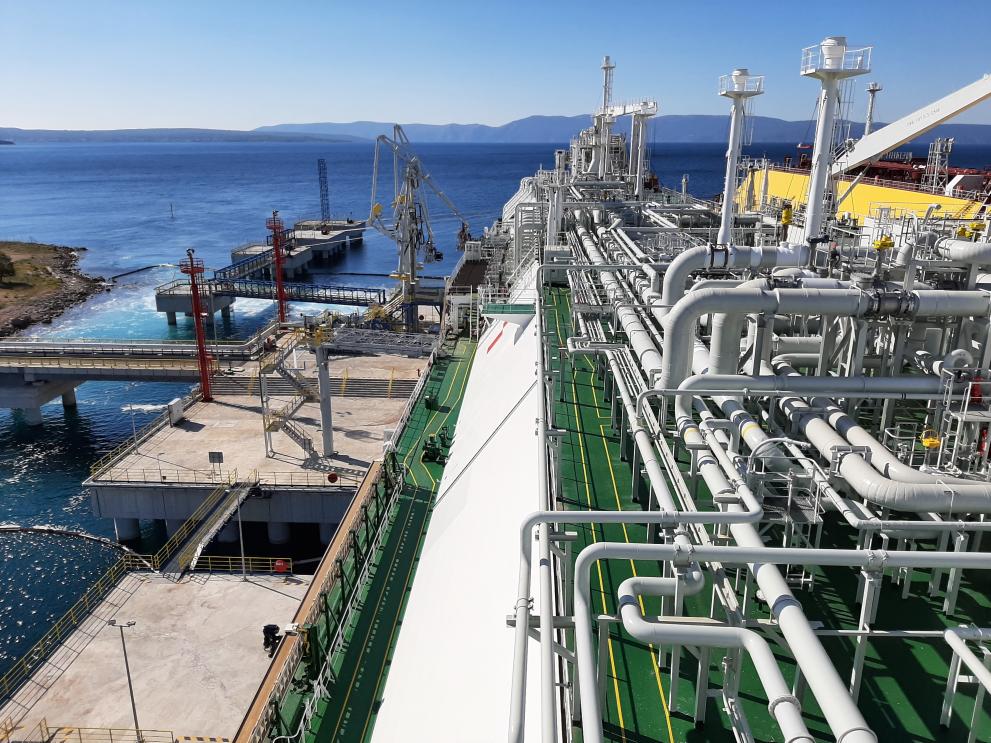
In a time where energy security and sustainability are paramount concerns, the development of liquefied natural gas (LNG) terminals plays a crucial role in ensuring a diversified and reliable energy supply. Therefore, the European Union has been actively investing in energy infrastructure projects under the Connecting Europe Facility for Energy (CEF Energy) since 2014.
On the occasion of the 10th anniversary of the CEF Energy programme, we want to put the spotlight on projects supported by this funding instrument that stand out as a crucial link in strengthening the energy landscape of different regions, such as the LNG terminal in Krk, Croatia, a new floating storage and regasification terminal ensuring security of gas supply to Croatia and to the region.
LNG Terminal in Krk
The liquefied natural gas (LNG) terminal on the island of Krk (Croatia) and its connecting 18 km pipeline were officially inaugurated in January 2021, aiming at increasing security of gas supply and improving competitiveness in the region.
The terminal represents a strategic gateway for the transmission and distribution of LNG in Central and Southeast Europe and it operates as a permanently moored offshore floating storage and regasification unit (FSRU), with a maximum yearly send-out capacity of 2.6 billion cubic meters of natural gas. It delivers gas to the Croatian national transmission network, connected with Hungary, Slovenia and Italy as well as with other non-EU Member States, such as Serbia and Montenegro.
One of the key features of the Terminal is its FSRU mentioned above, which enables the reception, storage and regasification of LNG. This innovative technology allows for flexible and efficient handling of LNG shipments, ensuring a steady supply of natural gas to meet the region's growing energy needs.
With its deep-water port and state-of-the-art infrastructure, the terminal serves as a crucial link in the European Union's efforts to enhance energy security and diversify its energy sources.
CEF Energy funding for crucial components
The Krk LNG Terminal received the status of Project of Common Interest in 2013, when it was included in the 1st PCI List. The PCI status allowed the project to be eligible for EU funding and was therefore co-funded by CEF Energy with over EUR 124 million: a total of six Actions were funded from 2014 until its completion in December 2020, both for studies and construction works.
CEF Energy provided financial assistance for crucial components of the project, including the construction of the FSRU, the expansion of port facilities and the implementation of safety and environmental measures. This support helped to leverage additional private and public investments, ensuring the timely completion of the terminal and its successful operation.
The project impact and benefits
The completion of the Krk LNG Terminal has had far-reaching implications for the energy landscape of Europe. By diversifying the sources of natural gas supply, the terminal enhances energy security and resilience, reducing dependence on a single supplier or route. This increased flexibility not only mitigates geopolitical risks but also contributes to a more competitive and integrated energy market.
Furthermore, the availability of LNG from the Krk Terminal provides an environmentally friendly alternative to traditional fossil fuels, supporting the EU's efforts to reduce greenhouse gas emissions and combat climate change. The terminal serves as a cornerstone for the development of cleaner energy systems, facilitating the transition to a more sustainable future.
In addition to its strategic importance, the Krk LNG Terminal brings tangible economic benefits to the region, creating jobs, stimulating local businesses, and attracting investment. Its role as a regional energy hub promotes economic development and strengthens cooperation among neighbouring countries, fostering greater energy independence and stability.
Conclusion
The Krk LNG Terminal exemplifies the transformative impact of strategic infrastructure projects supported by EU funding programmes such as CEF Energy. By facilitating the import and distribution of LNG, the terminal enhances energy security, promotes sustainability and drives economic growth in Croatia and across other countries. As the continent continues to transition towards a cleaner and more resilient energy system, investments in projects like the Krk LNG Terminal have played a vital role in ensuring security of gas supplies in a context of energy crisis and will continue shaping the future of European energy.
Details
- Publication date
- 27 February 2024
- Author
- European Climate, Infrastructure and Environment Executive Agency
